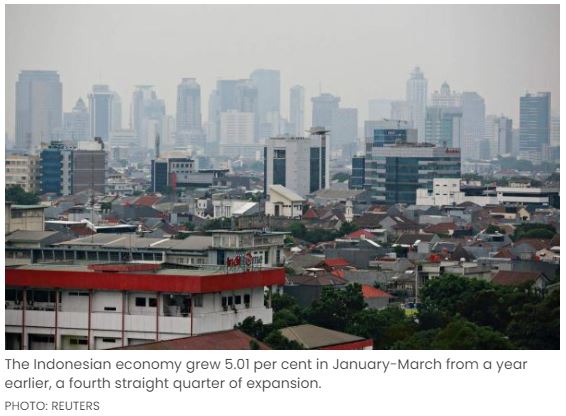Indonesia’s economy stays on growth path in Q1 as price pressures loom
AN historic rise in commodity prices and reopening of the economy from Covid-19 curbs helped Indonesia stay on a recovery path in the first quarter, but analysts say headwinds are growing from global monetary tightening and the war in Ukraine.
Already, annual consumer prices in April rose 3.47 per cent from a year earlier, the highest since 2017. The central bank aims to control inflation between 2 and 4 per cent this year.
South-east Asia’s largest economy grew 5.01 per cent in January-March from a year earlier, a fourth straight quarter of expansion. That compared to 5 per cent forecast by analysts in a Reuters poll and 5.02 per cent growth in the October-December quarter.
A recovery in consumption, investment and exports underpinned growth while surging prices of global commodities such as coal, palm oil and nickel, also contributed to record high trade surpluses for Indonesia, a major supplier of these resources. Indonesia posted US$9.3 billion trade surplus in the first quarter.
Covid-19 restrictions imposed earlier in the year, which have now been lifted, led to a strong pick-up in economic activities and spending, including travel, Margo Yuwono, head of Indonesia’s statistics bureau, told a news conference.
Consumption, which accounts for more than half of GDP, grew 4.34 per cent in the first quarter, up from 3.55 per cent in the fourth quarter.
Improved activity also led to a lower unemployment rate of 5.83 per cent by February 2022, data showed, compared with 6.26 per cent a year earlier. The rate was, however, still higher than the pre-pandemic level of 4.94 per cent.
On a quarterly basis, however, economists highlighted that growth momentum had slowed and cited geopolitical concerns among other factors that could hamper growth.
“Several global risks that will affect the national economic recovery include geopolitical risks, China’s economic slowdown and rising global inflation that has prompted tightening of global monetary policy,” Josua Pardede, an economist at Bank Permata, said.
Bank Indonesia (BI), which has pledged to keep interest rates at record lows until it sees signs of pressure on core inflation, intends to review its plans to normalise monetary policy in May to June, and assess any risks to the inflation outlook if the government changes energy prices and subsidies.
It had previously said interest rate levels would only be reviewed in the third quarter.
Faisal Rachman, Bank Mandiri economist, said that if inflation is not controlled and affects people’s purchasing power, it may force BI to raise rates sooner than projected.
Josua added that inflation could reach 4 per cent if the government makes adjustment to some fuel prices and electricity tariffs.
Indonesia’s palm oil export ban, imposed from Apr 28 to control domestic prices of cooking oil “could hold back the recovery if it remains in place for a long time”, Capital Economics’ Gareth Leather said.
Indonesia’s central bank last month lowered its economic growth outlook for the year to 4.5-5.3 per cent, from 4.7-5.5 per cent previously, citing slower global growth and disruptions to trade. REUTERS


 Thailand
Thailand




